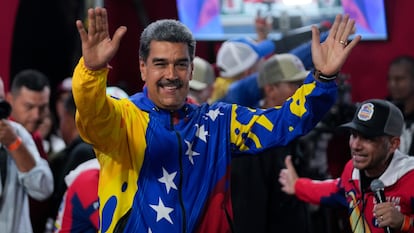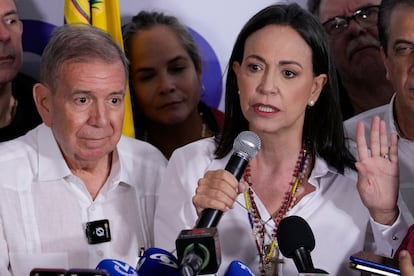Tension in Venezuela: Opposition rejects electoral authority’s claim that Maduro won the election
Opposition leader María Corina Machado said that in the coming days she will announce actions to ‘defend the truth’ about the real winner of the vote

Venezuela is experiencing moments of great tension due to the suspicion of fraud that hangs over the presidential election held on Sunday. The electoral authority of Venezuela, which is controlled by the governing Chavista movement, has declared President Nicolás Maduro the clear winner in an announcement made in the early hours of Monday. But the lack of transparency during the process has alerted the international community. The United States, Europe and, in a very forceful manner, Gabriel Boric of Chile, have expressed serious doubts about the veracity of these results.
The National Electoral Council (CNE) said that the current president and candidate of the ruling party has received 51.2% support, compared to 44.2% for his main adversary, Edmundo González Urrutia. “An irreversible result,” said the president of the CNE, who is a personal friend of Maduro and First Lady Cilia Flores. Neither González Urrutia nor the main leader of the opposition, María Corina Machado, who was barred from running by the courts, have recognized the results.
The continuity of 25 years of the Bolivarian revolution was at stake at the polls Sunday. The opposition, organized around Machado, posed a real threat to the permanence in power of Maduro, who was very worn out by an economic crisis that has led a quarter of his population to emigrate, and by the continuous accusations against his government for human rights violations. Machado was banned by the courts (also co-opted by Chavismo) from running in the election, and she gave her spot to González Urrutia, a retired diplomat who is very shy and found it hard to accept the assignment. Still, in a short time of campaigning, he became a familiar figure throughout the country and began to surpass Maduro in the most reliable polls. Chavismo felt threatened.
The opposition knew it was at a disadvantage going to the polls. Chavismo controls the entire state apparatus, including the CNE, the arbiter in the elections. However, Machado thought that her advantage was such that Maduro would not be able to hide it, either inside the country or outside, especially in front of the White House, with whom Venezuela is in negotiations over the economic sanctions and to secure international recognition. The attempt to get Chavismo to open up to initiate a democratic and transitional process hovered over the entire electoral campaign, sponsored by Washington, but also by Colombia, Brazil and Chile. The goal was to hold free and transparent elections from which a legitimate winner would emerge.

Shortly before polling stations closed, the opposition campaign team was warning that the CNE had only shown them 40% of the voting records despite having deployed witnesses throughout the country. Officials had stopped printing and sharing them. From that moment on, concern was at its peak among the opposition. Jorge Rodríguez, Maduro’s political operator, and Diosdado Cabello, the president’s right-hand man, appeared in public shortly afterwards, implying that they had won the elections, even though the vote count had barely begun.
Venezuela is facing a new political blockade. The presidential election was the result of a secret agreement between the United States and the Chavista government in Qatar, and viewed by the international community as a way of leading the country towards a democratic normality. In exchange for Washington lifting sanctions and releasing some prisoners, Maduro promised to organize free and competitive elections in which the opposition could participate on equal terms. This agreement was later endorsed in Barbados, in a dialogue in which anti-Chavista supporters also participated. The idea was that the election would produce a clear winner in the eyes of the world and Venezuela would return to the fold of international political and economic circles. For the moment, no such thing is happening.
People flocked to the polling stations to cast their vote from very early in the morning, and some even waited at the door all night long, sitting on chairs and sipping coffee. A large part of the country did not get any sleep. In the windows of the apartment buildings, the gray reflection of the TV sets throbbed, and radios remained turned on. People were hanging on social media updates. But the palpable tension did not translate into violence of any kind. Chavismo had warned of alleged plans by the opposition to provoke chaos on voting day. Except for minor incidents, the day unfolded uneventfully.
The day before the vote, Attorney General Tarek William Saab had warned that whoever offered voting data outside the CNE could be arrested and prosecuted. However, media at the service of Chavismo soon began to publish polls that granted Maduro a victory by a 10-point lead over González Urrutia. Some of the polling companies on which these surveys are based are false and were recently created. A case in point is a pollster named Lewis Thompson, supposedly based in Miami, which was recently created for the occasion: its website was opened 18 days earlier, as was its Twitter account, and the company does not show up in any U.S. business records. This kind of war of numbers was present throughout the day on Sunday.
Shortly after he was declared the winner, Maduro appeared on a stage in front of Miraflores Palace, the seat of the Venezuelan government. “I can say before the world that I am the re-elected president of Venezuela,” he said, surrounded by the core members of his administration. The president said the delay in the announcement of results was due to a hacking attempt against the CNE, coinciding with the version given earlier by the CNE president, who spoke of a “terrorist attack” against the system. Neither official provided any additional information about the alleged perpetrators or their objectives.
The opposition had wondered in the last few weeks whether Chavismo would truly show a willingness to abandon power in the event of defeat. The most hard-line Chavistas, such as Cabello or Rodríguez, had said that the revolution should continue, and at no time did they seem to be considering stepping aside. Younger Chavistas, such as Governor Rafael Lacava or the president’s own son, Nicolás Maduro Guerra, said that Chavismo had a democratic spirit and that in case of defeat they would go into the opposition. Cabello publicly admonished both in an indirect manner and said that they were “soft” individuals who like to “comb their hair sideways and dress in suits.” Hugo Chávez, the creator of the Bolivarian revolution, encouraged his people to wear tracksuits, a custom he copied from Cuba’s Fidel Castro.
Meanwhile, Machado has declared that González Urrutia, a retired diplomat whom she chose as her replacement when it became impossible for her to run as a candidate, is the real winner. “Venezuela has a new president-elect and he is Edmundo González Urrutia. We won! And everybody knows it. I want you to know that this has been something so overwhelming and great that we have won in all sectors of the country,” she said early Monday morning at a media conference. She said her team had received 40% of the voting records shared with them by the CNE, which certify that Urrutia “obtained 70% of the votes in this election, and Maduro 30%.” According to Machado, the opposition won a resounding victory, allegedly winning in all Venezuelan states. Machado also said that in the coming days she will announce actions to “defend the truth.”
Sign up for our weekly newsletter to get more English-language news coverage from EL PAÍS USA Edition
Tu suscripción se está usando en otro dispositivo
¿Quieres añadir otro usuario a tu suscripción?
Si continúas leyendo en este dispositivo, no se podrá leer en el otro.
FlechaTu suscripción se está usando en otro dispositivo y solo puedes acceder a EL PAÍS desde un dispositivo a la vez.
Si quieres compartir tu cuenta, cambia tu suscripción a la modalidad Premium, así podrás añadir otro usuario. Cada uno accederá con su propia cuenta de email, lo que os permitirá personalizar vuestra experiencia en EL PAÍS.
¿Tienes una suscripción de empresa? Accede aquí para contratar más cuentas.
En el caso de no saber quién está usando tu cuenta, te recomendamos cambiar tu contraseña aquí.
Si decides continuar compartiendo tu cuenta, este mensaje se mostrará en tu dispositivo y en el de la otra persona que está usando tu cuenta de forma indefinida, afectando a tu experiencia de lectura. Puedes consultar aquí los términos y condiciones de la suscripción digital.








































